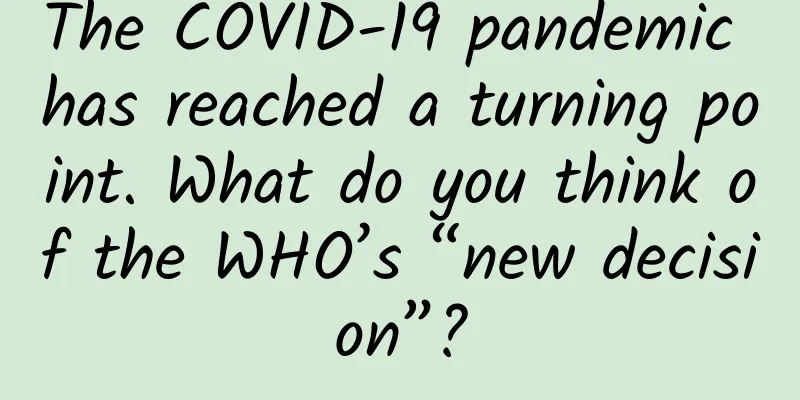The COVID-19 pandemic has reached a turning point. What do you think of the WHO’s “new decision”?

|
The World Health Organization announced on May 5, 2023 that the COVID-19 pandemic no longer constitutes a "public health emergency of international concern." More than three years ago, on January 30, 2020, local time, the WHO announced that the COVID-19 pandemic constituted a "public health emergency of international concern," the highest level of warning that the WHO could issue in accordance with the International Health Regulations. The COVID-19 pandemic has reached a turning point. What are the main considerations for this decision? What impact will it have on my country and the world? The reporter interviewed Liang Wannian, leader of the expert group of the National Health Commission's epidemic response and disposal leading group, and Shi Guoqing, deputy director of the Emergency Center of the Chinese Center for Disease Control and Prevention, and made the first interpretation. 01 WHO decision The harm caused by the COVID-19 outbreak can now be effectively controlled Q: What are the main considerations behind the WHO’s announcement that the COVID-19 outbreak no longer constitutes a “public health emergency of international concern”? Liang Wannian: I think it is mainly based on several considerations. First, judging from the current epidemic situation, the number of people infected with the new coronavirus, the number of hospitalizations and ICU admissions, and the number of deaths reported worldwide are all in a state of continuous decline. Second, although the new coronavirus continues to mutate, the harm that the mutants pose to human health has not changed significantly. Third, from a global perspective, a relatively good population immune barrier has been established through natural infection and vaccination among the population. Fourth, over the past three years, countries have strengthened the capacity building of medical assistance systems and public health systems, including human resources, protective equipment, and medicines. Taking all these factors into consideration, a relatively balanced state has been achieved between human resistance and the virus, and the basic requirements of the International Health Regulations on ending "public health emergencies of international concern" have been met. Of course, ending "public health emergencies of international concern" does not mean that the harm caused by the epidemic has completely disappeared, but it shows that with the current capabilities of mankind, this harm can be effectively controlled. 02 Restrictions on cross-border transportation, trade, travel, etc. Will further reduce Q: What impact will this decision of the WHO have on the world? What does it mean for my country? Liang Wannian: Some restrictions on cross-border transportation, trade, and travel will be further reduced or even eliminated, which should be the biggest impact. my country's international exchanges, including trade, tourism, and academic exchanges, are expected to reduce the inconvenience caused by some previous epidemic prevention and control measures. Of course, this does not mean that my country will leave the COVID-19 outbreak alone. As long as the harm caused by the epidemic still exists, we must continue to do a good job in relevant prevention and control, continue to work closely with countries around the world, and jointly take more targeted measures to protect the health of the people. Shi Guoqing: The WHO's announcement that the COVID-19 outbreak no longer constitutes a "public health emergency of international concern" does not mean the end of the epidemic. We are still in the process of an epidemic and we must continue to do a good job in related prevention and control. 03 Monitoring the mutation of the new coronavirus Continuously improve the public health system Question: How will my country respond to the COVID-19 epidemic next? Liang Wannian: There are several aspects of work that need to be continued. First, we must continue to effectively monitor the mutation of the new coronavirus and the occurrence and development of the epidemic, and at the same time make up for shortcomings, strengthen weaknesses, and continuously improve the public health system. Second, we must continue to strengthen vaccination for some high-risk groups and key groups. Third, we must continue to strengthen clinical treatment capabilities, especially those for severe cases. Fourth, we call on everyone to maintain some good hygiene habits that have been developed. Shi Guoqing: my country has established a multi-channel monitoring and early warning system, which monitors urban communities, sentinel hospitals, key places, urban sewage, etc., constantly observes changes in the epidemic situation, and conducts risk assessment in a timely manner. If a cluster of epidemics is found, an on-site investigation will be initiated immediately. We must continue to monitor and warn, and keep track of the epidemic trends. At the same time, we must strengthen health education and risk communication, view the epidemic scientifically, and maintain a positive attitude. Source: Xinhua News Agency The cover image and the images in this article are from the copyright library Reproduction of image content is not authorized |
<<: I want youth, not acne: A journey through the "skin factory"
Recommend
How long does it take to test urine hcg?
When checking urine hcg, routine urethral testing...
Small pimples on the neck after pregnancy
Everyone wants to have a long neck, but various p...
My nipples are sore. Am I pregnant?
The nipple is the most important part of a woman&...
[Fat Bear Science] The director of the Department of Gastroenterology said: "Two good friends had colon cancer, one was cured and the other was in the advanced stage." You must do this check after the age of 40
This is the case of a close friend of Chen Weiqin...
Why can't I get pregnant even though I ovulate?
Many women find it strange that they cannot get p...
How long does it take for breasts to grow larger during pregnancy? Why do breasts grow larger during pregnancy?
We all know that after a woman becomes pregnant, ...
How to make crispy pears? How to choose sweet pears?
Pears are cold fruits, sweet with a slight sour t...
Is Lushan one of the Five Great Mountains? When is the best time to visit Lushan Waterfall?
Mount Lu is one of the ten famous mountains in Ch...
Can I eat pigeon soup after a medical abortion?
Due to the composition of its own materials, pige...
[Medical Q&A] How to supplement iodine scientifically during pregnancy preparation?
Planner: Chinese Medical Association Reviewer: Sh...
How to choose fresh and good mangosteen? How to preserve mangosteen?
Mangosteen is a famous tropical fruit that can be ...
What is the special relationship between women's tears and desire?
In the relationship between men and women, women ...
Will drinking alcohol in the first month of pregnancy affect the fetus?
Will drinking in the first month of pregnancy aff...
What is the cause of thick and odorous vaginal discharge?
In our female friends' bodies, there is a uni...
A handful of salt can cause 4 diseases! Do these things to reduce the risk of death from heart failure!
When it comes to "eating", we have done...









